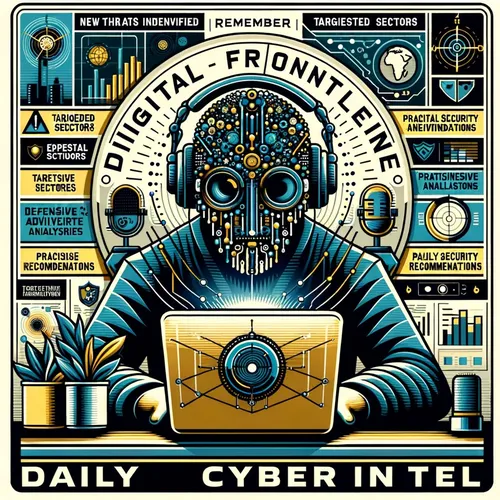Ting's Cyber Gossip: China's Hacking Frenzy Sparks DC Drama and Silicon Valley Jitters
- Author
- Quiet. Please
- Published
- Fri 18 Jul 2025
- Episode Link
- https://www.spreaker.com/episode/ting-s-cyber-gossip-china-s-hacking-frenzy-sparks-dc-drama-and-silicon-valley-jitters--67031047
This is your Digital Frontline: Daily China Cyber Intel podcast.
Good evening, listeners—Ting here, your digital confidant on the cyber frontline. Right now, ask anyone in the threat intel world, and you’ll hear the same thing: it’s a wild cyber summer. In just the past 24 hours, Chinese cyber actors haven’t taken a break; on the contrary, they’re amping up their targeting of US interests with a kind of bold confidence that’s turning heads in DC and Silicon Valley.
Let’s get straight into it. According to security giant CrowdStrike and confirmed by SentinelOne’s Dakota Cary, China is putting pedal to the metal with what experts are calling the “golden age of Chinese hacking.” We’re talking about a sharp spike in sophisticated attacks—specifically, over 330 discrete campaigns just last year alone, and the numbers continue to tick upward as new US officials get settled. Main targets? US government agencies, telecom and critical infrastructure giants, and even the communication platforms that glue us all together. The old playbook has expanded: now Beijing invites not just their usual intelligence arms, but an army of private sector hackers to go on digital offense. That means more hands on deck, more creativity, and, unfortunately, more headaches for defenders.
Top of mind today: Salt Typhoon. Recorded Future and Palo Alto Networks both warn that this crew isn’t content with small scores. Over the winter and spring, Salt Typhoon methodically scanned global networks and in the last five months alone compromised devices connected to at least seven telecom giants—including Comcast here in the US, and MTN Group and LG Uplus abroad. Their trick? Find unpatched routers, switches—those easy-to-overlook ‘edge devices’—and use them as backdoors into bigger fish. Pete Renals at Palo Alto highlights that this approach gives hackers a path straight into internal systems, meaning the privacy of ordinary customers—yes, that could be you or me—is at risk if network defenders don’t stay relentlessly patched and vigilant.
Meanwhile, inside DC, a new supply chain anxiety is brewing as Senator Tom Cotton demands the Pentagon assess the risks posed by big contractors relying on Chinese personnel—even in trusted, ‘escorted’ roles. The concern: these digital escorts in Microsoft’s cloud operations may not have enough technical know-how to stop a subtle exploit or hidden payload, potentially giving adversaries opportunities to slip past even strict access controls.
CISA’s Marci McCarthy emphasizes that, folks, this is not time for autopilot. Increased vigilance across all sectors is now the table stakes. The FBI’s analysis is clear: Beijing’s tactics are evolving, with a focus on attacking software and security vendors, and then quietly creating shadow accounts that can persist undetected for months.
For practical defense, here’s the Ting rule-of-thumb:
Patch edge devices and VPNs this week. Come Monday, do it again. Check your logs for new, suspicious user accounts, especially those with admin rights, and don’t assume domestic traffic is harmless—China is increasingly routing attacks through compromised US systems to evade detection. If you’re a contractor, review your third-party relationships for “escorted access” arrangements, and tighten up that supply chain.
From the nation’s capital to corporate data centers, the message is the same: China’s cyber apparatus is not just persistent—it’s adaptive, and it’s thinking long term. Businesses and agencies must do the same. Thanks for tuning in to Digital Frontline. Don’t forget to hit subscribe—Ting wants you ahead of the hack, not behind it! This has been a quiet please production, for more check out quiet please dot ai.
For more http://www.quietplease.ai
Get the best deals
